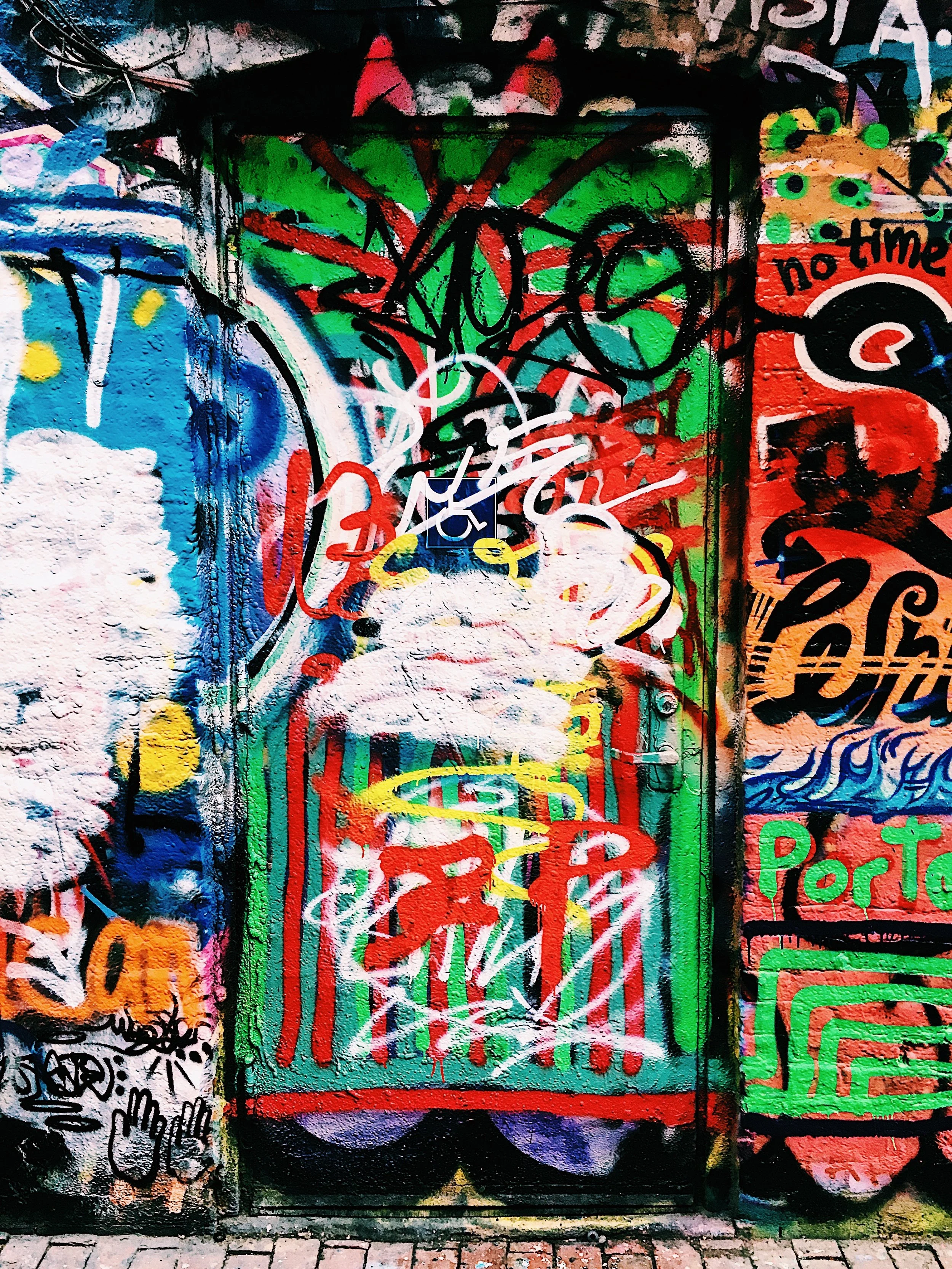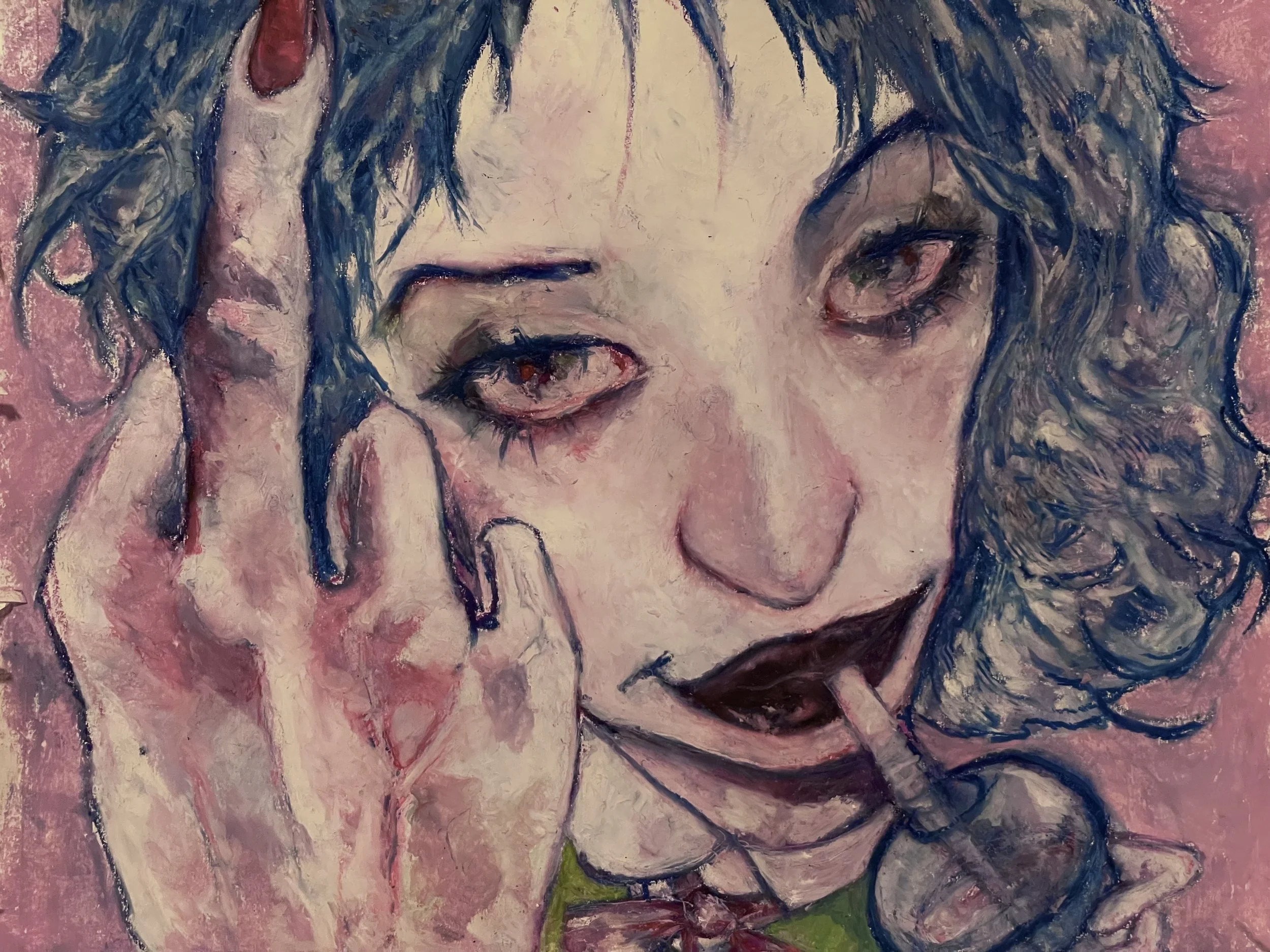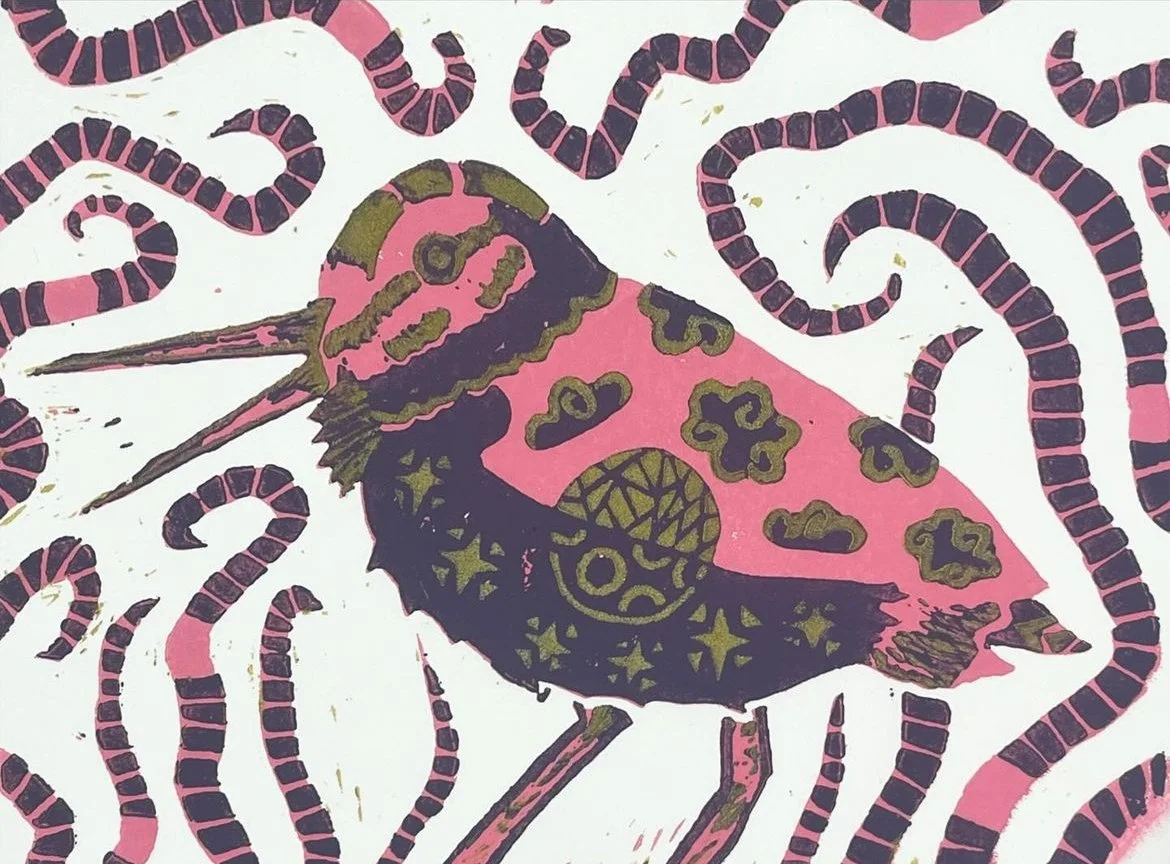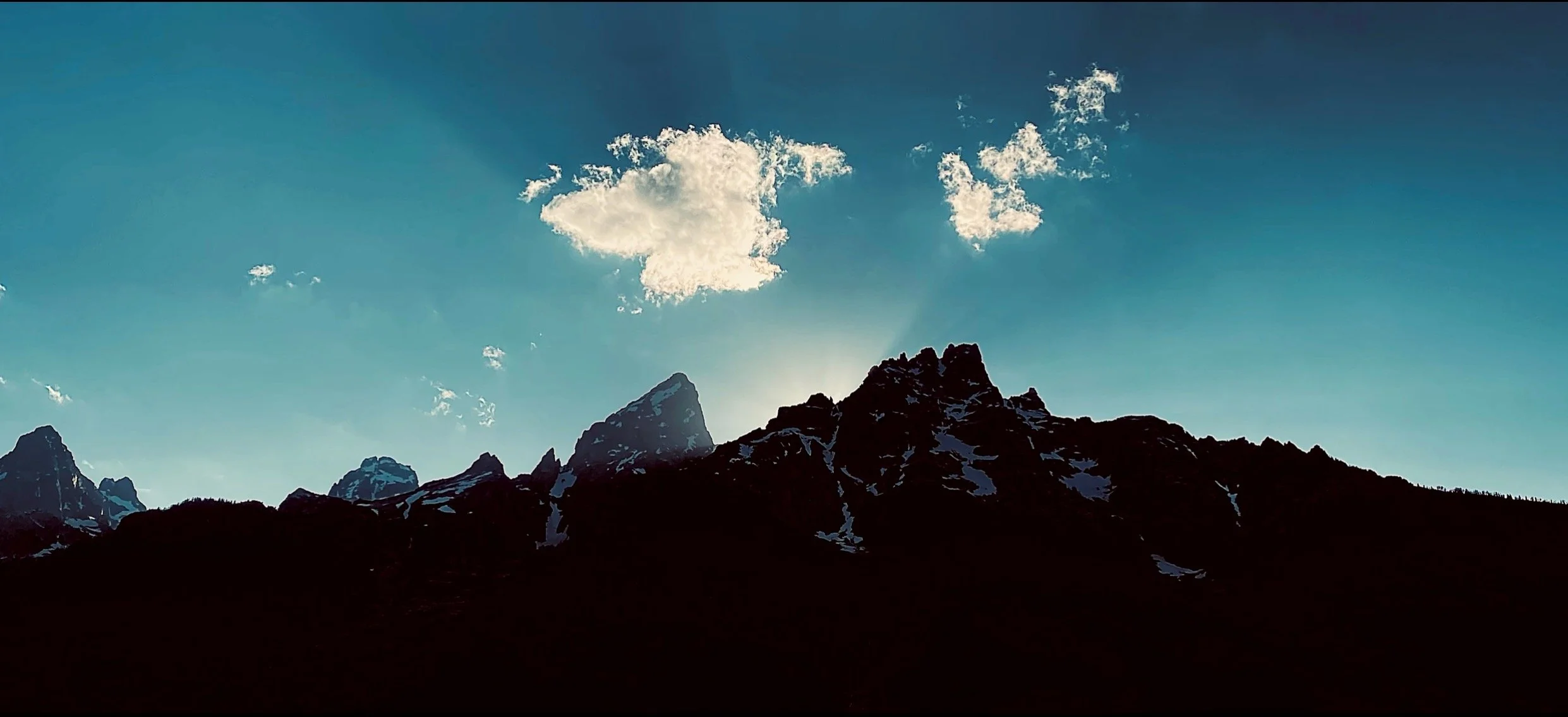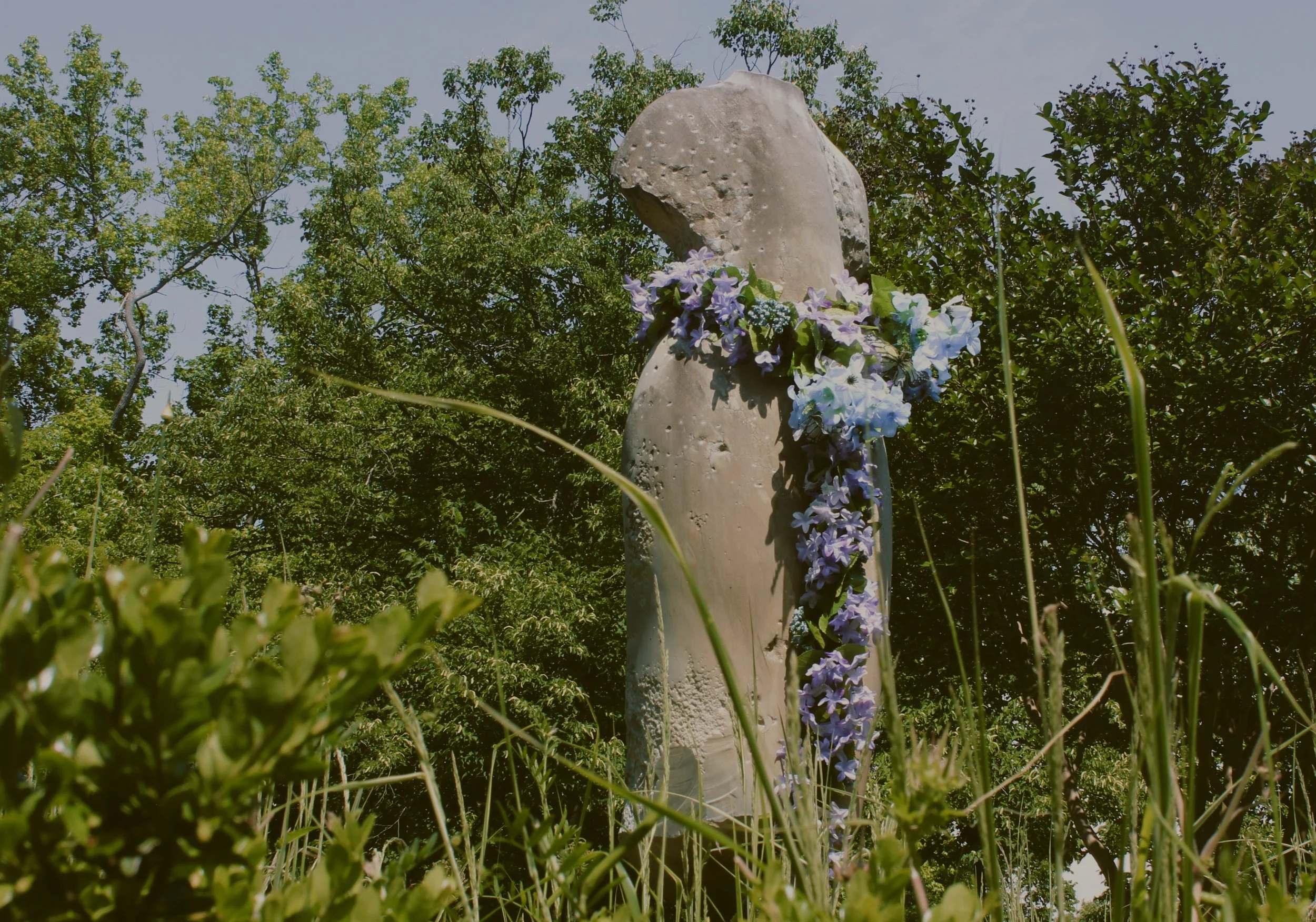
Blessed Be, Goddess by Ella Humphreys
Issue 36.1
Editor’s Note
Dear Washington College Community—
The change in season is almost always a bittersweet transition, and, lately, I’ve found myself thinking about the duality that exists within this ephemerality. After a heat-soaked summer, the chill in the air is refreshing; simultaneously, the relentless gloom is an unpleasant reminder of shorter, colder days to come. In the short time since writing my last note, life is changing all over again—a notion that is both terrifying and wonderful, both freeing and suffocating.
The recognition of such a multifaceted existence is an overwhelming one. Despite it all, not only do we accept this reality, but we embrace it fully and conquer it daily. As autumn begins to usher us into the lifeless winter months, it feels a fitting time to share an issue of Collegian that is so distinctly punctuated by grief yet so determined in its vulnerability.
Our first issue of contributor work emphasizes that our human experience is profound and fleeting all at once—and that it is exactly this complex, conflicting arrangement that breathes meaning into us. In the pages before you, you can find tension and uncertainty illuminating a shared search for purpose; you may catch gentle reminders of hope encased within unsettling uneasiness; you will certainly encounter striking visuals, robust language, and resounding sentiments.
The writers and artists featured in this collection are unapologetic and resilient in their navigation of emotionality. I invite you to immerse yourself in their worlds; savor their visions, and let them speak to yours. If anything, I hope Collegian 36.1 reminds you to take care of yourself and the people around you.
With love,
Lucy Verlaque
Editor in Chief, Collegian
Table of Contents
Blessed Be, Goddess by Ella Humphreys
“Trains Pass By” by Savannah Nies
Human Nature by Willa Risgin
“Something New But Not” by Brionna O’Dell
Give Me A Minute by Jeremy Cress
“PATRICIDE” by Connor Cordwell
L + Ratio by Arianna Jahangir
“Jesus and Carrie Bradshaw” by Riley Dauber
Acidic Veins by Sarah Coverdale
“This Beach Looks Different” by Savannah Nies
Ship With The Red Sail by Ella Humphreys
“interpreting birdsong” by Morgan Carlson
Timberdoodle Sunset by Morgan Carlson
“Ode to My Middle School Guinea Pig” by Evelyn Lucado
Nature’s Shelving by Ella Humphreys
“Pennies From a Heaven I Don’t Believe In” by Quinn Hammon
Final Hope by Sarah Coverdale
by Savannah Nies
Trains Pass By
Mom contemplates putting the dog down,
loudly smacking a mosquito on her arm,
that’s swiftly replaced by another. She asks,
how do you know when he’s done?
I have nothing to say. I can’t even look at her, instead,
staring helplessly into the bed of glowing campfire coals—
watching the last of the fire flicker out—
I try to ignore the meows of the stray
one-eyed calico, skittish and hiding in the palms
of central Florida; trains pass by in the distance,
warning horns sounding from miles away
through the thick forest laden with swaying Spanish moss—
when you go back to school,
don’t expect to see him again—
and I want Mom to stop talking. Let me enjoy the last of this warmth,
trembling fingers splayed and aching towards the ashes.
Human Nature by Willa Risgin
by Brionna O’Dell
Something New But Not
Every so often, a fast food restaurant opens in the parking lot between the abandoned Dollar General and the Mattress Warehouse. It operates out of a worn-down office building, its dark reflective windows propelling sunlight onto pedestrians and its revolving glass door smeared with handprints and black spray paint. I join the line stretching around the corner and observe the fluffy pink sky. Across the street, a dog and two birds fight over an overturned trash can. The birds’ metal wings slash across the dog’s mottled brown skin. Blood spills from the wound, and the dog gnashes his teeth at the birds’ metal bodies. Wait, metal bodies—
The line crawls forward slowly, like a million ants writhing toward a crumb of cake. A mass of bodies pressing toward greasy tables and stomachaches. My mouth waters at the thought. It takes ten minutes for me to reach the front. A faded Spirit Halloween banner stretches across the building’s facade.
Is it October? I think, plunging through the door. No, October was yesterday. My teeth worry my bottom lip, and I don’t stop until the sharp tang of blood wakes my tastebuds. No, October is tomorrow. I pull out my phone and open the calendar. That’s right. October doesn’t exist anymore. The days roll on in one endless chunk now. I furrow my brows, and a fresh wave of blood clogs my throat. No, that can’t—
“Yes?” The cashier asks. As she speaks, her tongue flicks out, split into two like a snake—a piercing glints from each tine.
I slide my own tongue over my teeth and say, “Cheese fries and water, please.”
The cashier inputs my order, her tired skin heavy against the frame of her body. She mumbles some number that doesn’t sound right, and I hand her my credit card. Behind her, the flickering image of an angel mops the floor. He’s wearing a stereotypical white gown, and white-blonde curls spill over his neck. A set of wings protrudes from his back, one golden, the other white and black, like he’s stuck between two variations of himself and can’t decide which he likes better. I blink and he’s gone, now mopping to the right of me. The cashier passes me my card and receipt.
I choose a table in the back corner. My friend Cora is already there, a half-eaten container of nachos in front of her as she paints her nails a subtle yellow.
“They’re Restarting everything today,” she says by way of greeting.
I hum and she glances up. An abyss of static consumes the brown of her eyes. For a moment, terror sinks its teeth into my spine. Then, the angel appears and disappears with my food, and my terror is replaced by a deep-seated hunger. I catch a glimpse of Cora’s smile.
Restart Day, I muse, gnashing my teeth over half-melted cheese and soggy fries. Restart Day, Restart Day. I repeat the words over and over in my head like a mantra, wrapping them up in the soft velvet of my confusion. The words are vaguely familiar but not. I don’t know what to make of them. Cora interrupts my pondering.
“Look,” she says, her head already turned toward the counter. An angel wearing a trench coat is ordering, his hands flailing in front of him as he half yells, half speaks to the cashier. Part of the trench coat is burned away, the singed edges revealing a gaping wound in his side. His ribcage is visible, and one of his ribs is gone. Behind him, other customers shuffle and yawn as they wait their turn.
I sip my water. “What’s wrong with his side?”
Cora’s eyes unfocus, that buzzing static swallowing them up again. My stomach twists, partly from my food and partly from a fresh wash of fear. The golden-haired angel pops up near the front door and starts to scrub the glass. The buzzing increases, and so does my fear, leaving my curiosity to wither.
Finally, Cora blinks. But the buzzing doesn’t stop. I look around to see if anyone else hears it and catch fresh blood dripping from the cashier’s ears.
“It doesn’t matter anymore,” Cora says. She polishes off her nachos and her metal teeth flash in the light. I look at the angel again.
Wait. My throat constricts around a clump of fries. I cough into my hands. Wait. Metal teeth? That can’t be—
“Commencing Restart sequence,” a woman’s voice says from nowhere and everywhere.
Around us, the interior of the building crumbles, revealing layer after layer until nothing remains but its silver skeleton. The ceiling collapses, chunks of drywall and wire dusting Cora’s brown hair.
I chew cheese and paint chips and try to remember why I was so scared. Outside, people huddle in mismatched circles. Their voices bubble over the sound of snapping concrete and dissolving bricks. The golden-haired angel still scrubs at the spot where the door used to be. The cashier is slumped over the counter. The angel with the missing rib calmly eats his burger. Blood pours down his side and puddles around his feet.
“Will it hurt?” I ask Cora. The question, though it slithers from my mouth, surprises me.
She shrugs. “A bit.” Behind her, the sky peels back, revealing more static. The static splits, and rows upon rows of 0s and 1s roll across what used to be the sky. Wait. The sky doesn’t exist anymore. But what was—
Cora stretches out her hand, her index finger poised in a mockery of something I can’t remember. I touch my finger to hers. The world stills. There’s darkness and the instant shock of electricity flowing through my veins. Something slick slithers into my brain.
It pokes and prods through the creases of my mind. It slurps up nerves and memories and churns them into something new but not. Something gleefully undoes me one muscle and bone at a time. 0s and 1s flash across my vision. Always green. Always moving. It’s dark again.
Something is building something new, but not. I am memories, but not. I am history, but not. Something implants images in the aftermath of its prodding. I am flying cars zooming across a polluted sky. I am the sharp edges of a city skyline, and I am flowers in a field spinning forever. I am carriage wheels rattling down cobblestones. I am a river swollen with the fresh rain of spring. I am handprints on a cave wall. I am something new, but not.
The darkness lifts. I open my eyes to a dazzling blue sky; my limbs splayed on a bed of flowers. My side aches. My mouth tastes like dust.
Give Me A Minute by Jeremy Cress
by Connor Cordwell
PATRICIDE
The act of aging
felt murderous. As lies
came easy to the tongue–
Like, a memorable
youth: I lost that gift
you got me: I am not
just all I desire: how
much we’re similar.
When I wore your clothes
as a child, cigarette smell
ingrained into those threads,
a veil against my evil
spirit. Soon I outgrew
these t-shirt shields &
apprehended a need for
replacement. I’m sore to say
a liar is as a liar does.
So only between
these confessionals, I
admit, both consumed
by some hunger;
how we are similar.
The smoke blazes out
from my lips, I do understand
though it makes me nauseous
to even think about–
we,
indentured to our flaws.
If only your jeans had not fit me so well.
L + Ratio by Arianna Jahangir
by Riley Dauber
Jesus and Carrie Bradshaw
The summer before my senior year of college, I started watching Sex and the City. It felt like a rite of passage, a show that every young woman must watch at least once in her lifetime.
I fell in love with it, devouring each episode like a sweet piece of candy. Carrie Bradshaw would run her fingers through her curly hair, and I couldn’t look away.
During the first season, Carrie meets Mr. Big. We do not know his real name. He is just Mr. Big. Everything about him is big: his height, his age — 43 to Carrie’s early 30s — his job, and his importance in Carrie’s life. He consumes her every waking moment.
Except Mr. Big does not care about Carrie. He sees other women. He takes things slow. He doesn’t say he loves her back. She farts in his bed and flees, wondering what he thinks of her now.
At the end of season one, Carrie talks with her friend Miranda about her relationship with Big. This is post-fart. They have stopped having sex, and Carrie blames her own flatulence.
“When did you get so obsessed with being perfect?” Miranda asks.
“I don’t know. It’s something about him. You should see me around him. I’m not like me. I’m like ‘together Carrie.’ I wear little outfits — ‘sexy Carrie,’ and ‘casual Carrie.’ Sometimes, I catch myself actually posing. It’s exhausting,” Carrie says.
Every year, my church puts on a performance of Jesus’ crucifixion for the Good Friday evening service. In the sixth grade, I was selected to play Jesus because I was the smallest and had long brown hair that matched his. When he was white, that is.
The other teens and I gathered in the narthex a few hours before the service to practice. Four boys and two girls played the guards who would escort me inside as I pretended to carry a cross on my back. Three girls in black would follow us with a loaf of bread, a candle, and a crown of thorns.
We practiced moving down the aisle in time with the music. One of the women in the choir would sing a song that my mother and I reference to this day. “Were you there when they nailed him to the tree?” she sang in a shaky vibrato, which felt appropriate for the repetitive “I tremble” line.
We had to make sure each line of the song matched up with our movements. The guards would nail my hands to the pantomimed tree. I would die. Then, they would carry my body out of the church.
I liked being the center of attention. I was a theater kid who rarely got the lead, and although this was a simple church play for a somber service, I still had trouble hiding my excitement. It didn’t help that some of the boys playing guards were cute and older than me. I felt their hands on my body as they carried me out of the church and hoped the piercing eyes of the Jesus statue couldn’t read my mind.
My excitement got me in trouble, though. This performance showed Jesus dying. This service was Sad with a capital “S.” I was not supposed to laugh as I looked out at the congregation.
Some of the boys thought they were high and mighty and chastised the gigglers. I wasn’t alone; the other girls playing guards and women had trouble staying in character. We argued that we were not laughing at Jesus’ death — no, never. We were just laughing at being in front of everyone. We were told to look serious, and that made us laugh harder.
Of the four guards, there was only one I looked at the most. One was arguably too old for me, and the other two were not physically attractive through my sixth-grade eyes. The last one, who often yelled at us for laughing and nailed my left hand to the tree, was blonde with dark eyebrows and eyes. He was very cute.
After practice and in between dinner and the service, the ten of us played a game of Sardines in the semi-dark church. The game is like hide and seek, except only one person hides, and the rest of the group has to find them. Once you find someone, you have to hide with them, like sardines in a can. The last person to find the group is the loser.
In a less serious setting, I was constantly reminded of the boys’ presence and wondered if they were looking at me or not, if my hair was rumpled from my costume, or if they judged me because I was laughing during practice.
During the first round, I managed to find the girl in a closet, and we bit our tongues to stop our giggles. The second round was trickier. As I searched, I tried to act a certain way because I always thought the boys were looking at me. I would tuck my hair behind my ear and wonder if they wanted to do it for me. I would smile and laugh, looking around to see where they were in the room and if they were looking at me like I was looking at them. Chances are, they never were.
After Carrie mentioned posing in her relationship with Big, I looked for these moments in each episode. Whenever we see her writing her column on her laptop, she has contorted herself into a new position. She’s playing with her hair, putting her legs up on her desk, or eating a popsicle and slapping her forehead in pain when she gets brain freeze. Even when Big isn’t watching her, she is still aware of how she would appear in his presence.
I was reminded of the spotlight effect, which I learned about in my AP psychology class during my senior year of high school. You always think you are the center of attention. Everyone looks at you whether you want them to or not. Everyone sees when you wear shorts even though it’s 55 degrees outside, and they are thinking, “Why is that girl wearing shorts when it’s 55 degrees outside?” If I found someone else wearing shorts that day, I felt a little less alone, a little less judged. See, I’m not the only one who wants to wear shorts today.
Except the spotlight effect says that people are so self- centered that, chances are, they don’t care what you’re doing or what you look like. They do not look at you as much as you think they do.
I didn’t know about the spotlight effect when I played Jesus, so I assumed everyone was looking at me.
My prediction was correct when I found the group hiding in the back stairwell near the choir room, and one of the boys — not the blonde beauty — stared at me. My body felt like it was covered in bugs. I was under a microscope, but the wrong person was examining me. I wish my blonde crush was nearby; he could look all he wanted.
Church provided a limited number of crushes — not many boys attended Sunday School — but during the week, I had my pick of the litter.
In my sixth grade class, I would stare at my crush-of-the- day and hope he was looking at me, too. Of course, I would never know unless I glanced at him, and chances are, he would look away. If he was even looking at me in the first place.
A glance is enough to inspire an entire gossip session between friends. “He was definitely looking at you,” my friend told me, referencing my crush (this time, he lasted the whole year). I didn’t even need a conversation or a date invitation to believe he had feelings for me.
If I shared a class with him, I would try to change what I was doing to look more appealing. No scratching my nose, but running my fingers through my hair was allowed. Maybe a cute giggle instead of a cackle here or there to inspire a fan-cam- worthy memory.
As soon as I knew a boy I was vaguely interested in was in the room, I would become hyper-aware of his gaze. He was looking at me, so I had to meet expectations. It helped if I was wearing a cute outfit, or even one that showed off my boobs, which my mom claimed — even at my young age — would help me get a boyfriend.
As I grew up, though, I learned that none of the right guys would look at my boobs. During my freshman year of college, I was assigned to a random group for a communications class project. We met in the library, and as I shrugged off my jacket, I could feel one of my groupmates looking at my torso.
Compare this gaze to when my crush complimented my top at a party. He was probably just being nice, but the comment was enough to send me into a daydream where we dated, kissed in my room under the glow of my fairy lights, and met each other’s families. One look can inspire plenty of delusions, too.
When I return to campus for the start of my senior year, my three roommates and I continue to watch Sex and the City. As the episodes progress, we groan at Carrie’s poor decision- making skills. After the episode where she says she poses in front of Big, she sees him attending church with his mother. The two have never discussed religion before, and this moment proves how little Carrie knows about the most important man in her life.
When Carrie mentions this to Big, he shrugs it off. Of course, she makes another stupid decision: she drags Miranda to the church, drops her Bible in the middle of the service, and comes face-to-face with Big and his mother.
As we watch episode after episode, we argue over which woman — Carrie, Miranda, Charlotte, and Samantha — we are. I am cast as Carrie because I am an aspiring lifestyle journalist.
Even in class, I cannot help but aspire to a specific image. I go above and beyond in my outfit selections, begging for compliments. I style my hair with a pair of sunglasses even when it’s raining because I like the effect. The other day, I let my hair fall around my face, so I looked extra mysterious and studious as I wrote down my notes, wondering if my crush in the next row was looking at me.
At my newspaper job, I wear a low-cut dress that I like, but wonder if anyone is staring at me because my mother asked me this summer to pull the neckline up before going to church.
At the end of each long day, I crawl under the covers and realize just how exhausted I am.
Acidic Veins by Sarah Coverdale
by Savannah Nies
This Beach Looks Different
I’m at the point now,
just outside the haze of light,
where, from a distance,
I no longer look human
or living, only shadow
like a cardboard cutout,
backlit and swaying in
saltwater sea breeze
and otherwise outlined in
black.
This morning was deliciously cold,
through the window of my parents’ ‘79 airstream—
this air, my summer savior in the dawn before its dew—
and I trembled, unable to stifle my fervor or get up
for a blanket against this cold I had been searching for
since I’d read a book that said it, a chill
I could describe as “crisp.”
My lungs never burned the right way
until I woke up before the sunrise,
remembered myself.
I long for colder weather and the end
of my summer depression, so I read
Dracula at the beach in the middle of August,
listening to the ocean hurling itself onto the sand,
receding again.
Blue hour always makes me sick,
when the whole world falls
into a wash of cornflower, dunes
and sky and asphalt, and the Atlantic has come over me.
Ship With The Red Sail by Ella Humphreys
by Morgan Carlson
interpreting birdsong
nearly 1,000 birds die after striking chicago building.
—The New York Times
one jagged egg tooth crumbles white walls,
launching beady-eyed chicks into a dome of stars,
their first evolutionary instinct to gaze at constellations.
nuzzled in their nests, they dream of their delicate wingtips
burning bright as a blazing comet,
their hollow bones reverberating with an all-consuming desire
to repaint the sky with a vibrant palette of molted color.
somehow, weightless fledglings evolve a dense knowledge
of cosmic maps and subtle shifts of the sun
that softly beckon feathery tails south
as they chase closing curtains of darkness.
do they know that their bills contain magnetite
that spin tiny heads toward Earth’s fields like a compass? or
does Earth’s force pulse through their celestial bodies
like a blind faith flapping reverent wings into orbit,
as if passerines plumpen into sentient moons,
their migratory routes a devotion to Mother’s divine energy.
i’ll never understand why you think
my rugged voice rattling from self-polluted lung
delivers a message of cardinal importance
louder than thrush’s forest-filling symphonies
jingling harmonically from pebble-sized syrinx.
every year as Her green globe distorts,
their belief in planetary pilgrimage remains unwavering.
when avian sacrifice snowballs into a hailstorm
of a thousand downy martyrs,
the weight of neither pellets nor meteors
crack the invisible wall that spear-like bills can’t pierce.
Timberdoodle Sunset by Morgan Carlson
by Evelyn Lucado
Ode to My Middle School Guinea Pig
I think it was your ridged little body,
arms outstretched
that made me wonder if
there’s a guinea pig God,
and I wonder if there’s someone looking
down at us and at your overgrown
nails that I was too scared
to trim for fear I’d break you.
I think he’s in the food you
never ate; It sits in its plastic
package, opened and untouched,
spoiling slowly and sour
like rotted clementines
hidden in the fruit basket
by the corner of the shelf,
waiting for a little girl’s
Dad to peel away the
browned skin and reveal
the tart, sharp fruit melting
in the open, musty air.
He’s in the empty plastic cage
I called your home, like a little
broken house made of dirty paper
bedding soaked in stench,
and I wonder how he chooses
who stays at the pet store and
who’s brought home in a cardboard
box by the little girl that I was;
One who feeds oranges and other sweet
things like yogurt drops that guinea pigs
really aren’t supposed to eat
but she means well, really she does.
But my gut and its wretchedness
says that the Guinea Pig God left us, and you to
be wrapped up in an old washcloth
and buried on the side of the house,
in the cold and rock, beneath the trash cans
to keep away the stray dogs and raccoons
and foxes and all the other lost creatures
looking for their forgotten Gods
and other vile things.
Nature’s Shelving by Ella Humphreys
by Quinn Hammon
Pennies From a Heaven I Don’t Believe In
In my inability to abandon the thing that we started, what remains of our garden nags for attention in a voice fixed to the corner of my skull like a parasitic beetle, an armored lump with its pill of a shell. I am heavy enough to sink into concrete as I walk to the plot we’d developed so fondly. The site of our garden is now a nursery for low, wet clouds, an orchard of sticks, rags, and rot. I avert my eyes as it appears on the horizon.
Each leaf seemed to swell when we tended them together, but they’re dust in my fingers when they notice she is gone. I wish they buried her here to help stabilize the soil. Although I notice her in each passing figure, our block now a mirror-maze that I walk beside her ghost, I have yet to see another face arranged the way her’s was, as if grown from the bed of our vegetable garden. Her nose like a cherry tomato. Hair dark like roots, winding like vines, laced now with the earth she’d always loved. Her mouth was the crooked wire on the fence that keeps the bushes at bay.
But her eyes were round and bronze and flat, like a penny pressed to asphalt. I might peel her from the pavement when the road is clear, heads-up for the good luck we had always, apparently, needed.
No number of ladybugs found clung to rose bush
branches, red and globular like drops of blood, could cure this curse she left for me. I never meant to hold her final words in my hands, to be cut on the blade of them, malignantly dull like garden shears left to rust in the rain. I’m gripping our shears, pruning branches like bad memories, and these injuries are infested with the thought of her, blistered with the false impulse to turn and catch her over my shoulder. I remember her the same way I remember cutting myself on our barbed wire fencing.
Common, appealing, potentially poisonous, her memory has become the mock strawberries that speckle the grass like her freckles, like a vicious case of hives. I crush a handful in my fingers and am washed in bitter water.
Walking through our garden now, what remains of our care pokes dryly from the soil like the bones of a body half- buried. Stray branches catch my clothing as if to remind me of their presence. These plants have no capacity to long for their life. It might be a mercy to let them wither. It would be a mercy to myself to leave this place untended.
I never meant to hold her so tight she would pop like rotten fruit in my hand, to neglect her so profoundly she would be lost in the undergrowth. To ignore her words in the only way that mattered. All that I meant was to take her every phone call, to be as constant for her as the sign by the crosswalk or the straight-faced scarecrow that stares over our plot. I am bitter now, that these things are unburdened by words whispered in lifeless ears, thoughtless in a way I often wish I could be. We both, then, are mock strawberries, Alice and me. I gather my bitterness since it threads me to her. And unlike myself, the unbitter scarecrow carries no responsibility but the task of frightening birds.
The walk from our garden is steeped in new-found seclusion, her words of farewell still audible as the murmur of tires on pavement. Each voice in the distance resounds like the ring of the final phone call she made to say goodbye. I want to banish her from our garden and latch up the gate. I want to buy her back with the lost penny that blemishes the sidewalk. But I can’t tell anymore which she would have wanted. She told me on the phone she was desperate for rest. If I am honest with myself, I think that she’s gone, dissolved into the soil like fertilizer.
Entertaining the urge to dissolve from this place, I am both eager and afraid to abandon the garden, nursing my proximity to the remains of these vegetables as if traces of her can be found in the decomposing rinds. Grief grows low on vines and bursts with too much water like the melons we grew and abandoned to the birds. There is more than we can eat, more even than we can give away. All that is left is to let it fester in mounds of glistening organic gore. I hate that the image reminds me of her.
On days that Alice would have stood at my shoulder, I feel as though I am punished for my unconscious evasion of what I knew she had told me over the phone when I spoke to her last. I think of her, buried, each time I sow the garden. I see her in the bronze of bent, rusted wire, in the dirt that crusts my fingers. I picked up her call that evening, casually as plucking a penny from the sidewalk. I swallowed her words, but I tasted their rot, their blood-flavored tang like a coin on my tongue. I wish, now, that I had let the phone ring forever. I feel depraved, and I look back, where that garden is washed in too-bright sun, and I can’t help but complain that there is twice as much labor.
On mornings like this one, when the spade sits heavy in my dirt-dusted hand, I feel almost as though I could hate her for leaving me here to decay with last summer’s tomatoes.
Final Hope by Sarah Coverdale


